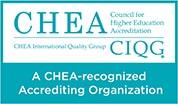Accreditation is a mechanism for assuring academic quality in higher education. The institution that sponsors an accredited CoARC respiratory care program, is required to have institutional accreditation by a regional or qualified institutional accreditor which must be recognized by the U.S. Department of Education and must have provisions for Title IV Eligibility. This allows that institution to provide:
- Eligibility for Federal Financial Aid.
- Ability to Transfer Credits: Accreditation provides for establishing the acceptability of credits from institution to institution.
- Ability to Obtain an Higher Degrees: If your Associates or Baccalaureate degree was earned at an unaccredited institution you run the risk that the school in which you would like to enroll to earn a higher degree will not accept your prior degree.
Professional programmatic accreditation means that in addition to the college or university’s regional or national accreditation, a respiratory care program may choose to seek CoARC accreditation, which is a voluntary peer review process to evaluate the program’s compliance with CoARC Standards.
Program accreditation by CoARC is necessary in order to be eligible for the National Board for Respiratory Care (NBRC) professional credentialing examinations. Any questions concerning the eligibility requirements for the NBRC examinations need to be directed to the NBRC.
CoARC does not recommend programs. Specific information about programs can be located on each program website. Students are encouraged to contact the program to obtain additional information. Other valuable sources of information are high school or college counselors and advisors, or college admissions officers.
Every institution retains the right to determine what credits and degrees it will accept. Transferability of credits depends on a number of factors, including accreditation, curriculum compatibility, and grades. While it is typically true that many institutions recognize transfer credits only from regionally accredited institutions, the basic principle underlying issues of transfer is that each institution is responsible for determining its own policies and practices in regard to transfer and award of credit. CoARC requires that institutions have a policy on transfer of credit by which the institution certifies that courses accepted for credit from sending institutions achieve student learning outcomes comparable to its own courses. In order to determine whether or not your credits and degrees can transfer to another program or institution, you will need to check with the Registrar or Admissions office of the school to which you intend to apply.
CoARC does not rank programs. The primary responsibility of CoARC is to accredit programs based on their compliance with established accreditation standards.
Refer to our Find an Accredited Program link. You can search by state or name. If you find a program that you are interested in, you would need to contact that program directly to discuss admission and completion.
The American Association for Respiratory Care (AARC) website is an excellent resource to help you begin or further your career in respiratory care.
Successful completion of a CoARC-accredited program is one of several requirements for eligibility to take the National Board of Respiratory Care (NBRC) Credentialing Exams. There are additional licensure requirements for you to work as a respiratory therapist in most U.S. states. Visit the NBRC website for more information on the credentialing examinations as well as contact information for each of the state licensing boards.
Loss or withhold of accreditation occurs infrequently. The accreditation process is designed to foster programmatic excellence and continuous improvement. The processes of peer evaluation and follow-up offer support and guidance to programs that need to improve practice in order to meet accreditation standards or policy requirements. Most programs are able to correct any deficiencies and retain CoARC accreditation. However, the primary purpose of accreditation is quality assurance to the public. The loss or withhold of accreditation means that CoARC believes the program lacks sufficient quality to be accredited. CoARC may withhold or withdraw accreditation if a program has taken action that places it significantly out of compliance with CoARC Standards or has not satisfactorily explained or corrected matters of which it has been given notice. Loss or withhold of accreditation is subject to a request for reconsideration and appeal. The program’s accredition status continues pending completion of any reconsideration or appeal that is filed. A program that has had its accreditation status withheld or withdrawn shall no longer be allowed to admit students. However, enrolled students completing the program that has had its accreditation status withheld or withdrawn are considered graduates of a CoARC accredited program and will still be eligible to apply for the NBRC Respiratory Care Credentialing Examination(s).
Students that graduate from programs holding Provisional Accreditation are eligible to apply for the NBRC Respiratory Care Credentialing Examination(s). Graduates of a program designated as having the Provisional Accreditation status have the same rights and privileges as graduates of an accredited program.
Find CoARC Accredited Programs
Job Board
Map of Program Outcomes
Program and Personnel Changes
